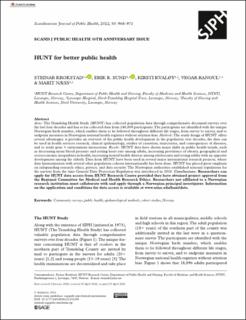HUNT for better public health
Peer reviewed, Journal article
Published version
Permanent lenke
https://hdl.handle.net/11250/3069057Utgivelsesdato
2022Metadata
Vis full innførselSamlinger
Originalversjon
Scandinavian Journal of Public Health. 2022, 50 (7), 968-971. 10.1177/14034948221102309Sammendrag
Aims:
The Trøndelag Health Study (HUNT) has collected population data through comprehensive decennial surveys over the last four decades and has so far collected data from 240,000 participants. The participants are identified with the unique Norwegian birth number, which enables them to be followed throughout different life stages, from survey to survey, and to endpoint measures in Norwegian national health registers without attrition bias.
Methods:
The study design of HUNT offers several advantages: it provides an overview of the public health development in the population over decades, the data can be used in health services research, clinical epidemiology, studies of causation, trajectories, and consequences of diseases, and to study gene × environment interactions.
Results:
HUNT data have shown major shifts in public health trends, such as decreasing mean blood pressure and resting heart rate among adults, increasing prevalence of obesity, geographical and socioeconomic inequalities in health, increasing mental health distress among adolescents and young adults with an opposite development among the elderly. Data from HUNT have been used in several major international research projects, where data harmonization with several other population cohorts internationally has been done. HUNT has placed great emphasis on safeguarding research ethics, privacy, and data security. The Norwegian authorities established national regulations for the surveys from the time General Data Protection Regulation was introduced in 2018.
Conclusions:
Researchers can apply for HUNT data access from HUNT Research Centre provided they have obtained project approval from the Regional Committee for Medical and Health Research Ethics. Researchers not affiliated to a Norwegian research institution must collaborate with and apply through a Norwegian principal investigator. Information on the application and conditions for data access is available at www.ntnu.edu/hunt/data.

